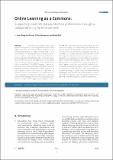Files in this item
Online learning as a commons : supporting students' data protection preferences through a collaborative digital environment
Item metadata
| dc.contributor.author | Wong, Janis | |
| dc.contributor.author | Racine, Lea | |
| dc.contributor.author | Henderson, Tristan | |
| dc.contributor.author | Ball, Kirstie | |
| dc.date.accessioned | 2023-07-17T13:30:04Z | |
| dc.date.available | 2023-07-17T13:30:04Z | |
| dc.date.issued | 2023-06-01 | |
| dc.identifier | 289866130 | |
| dc.identifier | f1181549-ac9c-4de3-91b6-133c048f8f0e | |
| dc.identifier | 85167907776 | |
| dc.identifier.citation | Wong , J , Racine , L , Henderson , T & Ball , K 2023 , ' Online learning as a commons : supporting students' data protection preferences through a collaborative digital environment ' , Journal of Intellectual Property, Information Technolology and E Commerce Law , vol. 14 , no. 2 , pp. 251-277 . < https://www.jipitec.eu/issues/jipitec-14-2-2023/5736 > | en |
| dc.identifier.issn | 2190-3387 | |
| dc.identifier.other | ORCID: /0000-0001-6936-7490/work/139156620 | |
| dc.identifier.uri | https://hdl.handle.net/10023/27971 | |
| dc.description.abstract | The COVID-19 pandemic has accelerated the adoption of technology in education, where higher education institutions had to implement online teaching models overnight, without time for due consideration of appropriate data protection practices or impact assessments. The General Data Protection Regulation (GDPR) attempts to limit the negative effects caused by the digitisation of education such as lecture capture, tutorial recording, and education surveillance. The GDPR, however, may be insufficient in removing the power imbalance between students and their institutions, where students as data subjects have no choice but to accept their institutions’ terms or be locked out of academia. To increase protection of students’ autonomy, we propose an online learning data protection-focused data commons to support their agency with regards to protecting their personal data. We explain how a commons could apply to online learning, then develop and test an application to put the commons into practice. From our results, we find that although over 50% of students trust universities and staff with their online learning personal data, more transparency on institutional policies and data protection rights can support higher online learning participation rates, help mitigate potential data protection harms, and give students agency over their personal data beyond consent. We conclude that further research is required to move away from consent as the lawful basis for tutorial recordings, support inclusive online learning pedagogies, and balance the implementation of educational technologies with the need to deliver online learning to benefit students’ academic experience. | |
| dc.format.extent | 27 | |
| dc.format.extent | 1786487 | |
| dc.language.iso | eng | |
| dc.relation.ispartof | Journal of Intellectual Property, Information Technolology and E Commerce Law | en |
| dc.subject | Commons | en |
| dc.subject | Data commons | en |
| dc.subject | Data protection | en |
| dc.subject | Education | en |
| dc.subject | Online learning | en |
| dc.subject | LB Theory and practice of education | en |
| dc.subject | ZA4050 Electronic information resources | en |
| dc.subject | E-NDAS | en |
| dc.subject | MCC | en |
| dc.subject | NCAD | en |
| dc.subject | AC | en |
| dc.subject.lcc | LB | en |
| dc.subject.lcc | ZA4050 | en |
| dc.title | Online learning as a commons : supporting students' data protection preferences through a collaborative digital environment | en |
| dc.type | Journal article | en |
| dc.contributor.institution | University of St Andrews. School of Management | en |
| dc.contributor.institution | University of St Andrews. Centre for Research into Equality, Diversity & Inclusion | en |
| dc.contributor.institution | University of St Andrews. School of Computer Science | en |
| dc.description.status | Peer reviewed | en |
| dc.identifier.url | https://www.jipitec.eu/issues/jipitec-14-2-2023/5736 | en |
This item appears in the following Collection(s)
Items in the St Andrews Research Repository are protected by copyright, with all rights reserved, unless otherwise indicated.

